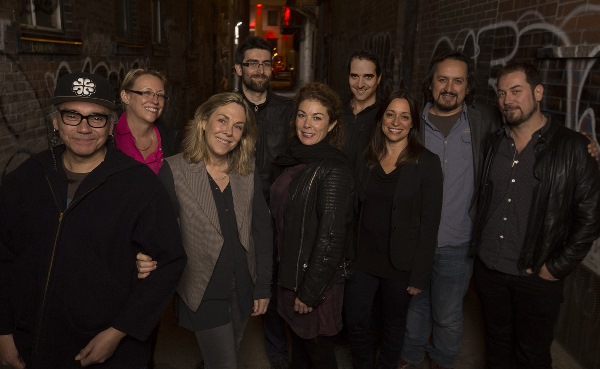The 2016 New Establishment: Rezolution Pictures
From Playback magazine: Montreal prodco Rezolution Pictures has boldly delved into games and VR while creating award-winning TV.

The New Establishment is an annual feature in Playback’s fall issue, celebrating the next generation of established independent Canadian production companies (the 5 to Watch, to follow next week, focuses on up-and-coming talent). Led by innovative, results-driven execs, these companies were selected to illustrate the success that can be had when skill, hard work and yes, luck, combine to make greenlights, MGs and app-store launches materialize, again and again.
Diversification isn’t just a buzzword for Rezolution Pictures, it’s an essential part of the Montreal-based company’s growth strategy. In the past five years, the prodco’s executive producers Ernest Webb, Catherine Bainbridge, Christina Fon and Linda Ludwick have expanded into video games and virtual reality, while at the same time broadening their company’s film and television production slate.
The company launched in 2001 with the goal of telling Indigenous stories through documentaries, going on to produce nearly 20 documentary films and television series, including the Peabody Award-winning Reel Injun.
“When I first started watching TV, I never saw myself on screen. Even when we watched cowboys and Indians movies, I never saw myself,” says Webb, who grew up in the the Cree community of Chisasibi.
And while it achieved that goal, in 2010, the Rezolution team could see the writing on the wall: the traditional television model was under considerable stress and the producer of documentaries and factual entertainment recognized they’d need to look outside of the television space to thrive long-term. So, in 2010, the Rezolution founders launched video game development studio, Minority Media, with Electronic Arts (EA) software engineer Julien Barnoin and creative director Vander Caballero.
At the time, Caballero was looking to tell his story of growing up with an abusive father through a video game. “In the gaming world, everyone looked at him as if he had two heads,” says Bainbridge. “Adult storytelling had no place in that world [at that time].” However, with their longtime traditional-production experience, Rezolution was uniquely positioned to tackle the subject matter.
The resulting video game, Papo & Yo, is credited with ushering in a new genre: empathy games. “It helped a lot of people deal with emotions that were deep inside,” says Ludwick. “This innovative game was the start of our success and a very key part of it.”
Looking to explore even more innovative territory, the company next decided to jump into virtual reality. “It was a really risky move,” recalls Bainbridge. “[But] we knew we had to be ahead of the curve.” In 2014, the company began work on its first virtual reality game, Time Machine VR. While the future of VR adoption is still uncertain, the industry is clearly excited about its potential and Bainbridge says her company is committed to helping figure it out.
“Taking that risk to diversify into VR has allowed us to be at the forefront of a new technology and our ears are really close to the ground as the revenue models are being developed. We’re going to know earlier than most what’s going to make money in VR,” she says.
In May, Minority Media released Time Machine VR for Oculus Rift and HTC Vive headsets and has plans to release the game for PlayStation VR later in the year. The company is also developing a new VR experience for Google’s soon-to-be-released mobile VR platform, Daydream.
But the company’s ambitions don’t stop with gaming. In 2015, the Minority Media team launched MinorityVR, which aims to help broadcasters produce VR experiences for their content. “We saw an opportunity to bring broadcasters into the VR world,” explains Fon. The company launched with Sylvain Croteau, cofounder of mobile gaming company Ludia, as its CEO, writer and producer Michael Zaidan as creative director and former head of international production at Zone 3 Isabelle Bourduas as SVP.
The television industry connections and gaming business understanding that these partners bring to the company has already helped open some doors, the founders say. The company’s first project was creating three first-person, point-of-view VR companion pieces for A&E Networks’ Fall Into Me web series, which debuted in February. Shortly thereafter, it was announced that former COO/CCO at Fremantlemedia Group Gary R. Carter would board the company as senior creative and strategic advisor. “It’s partnering with the best that keeps elevating us,” says Bainbridge.
Even with all of its expansion, the company is staying true to its roots. Its Tracey Deer-directed comedy Mohawk Girls is now in production on its fourth season for APTN and the company is in development on an eight-part one-hour dramatic series created by Rhymes for Young Ghouls director Jeff Barnaby. They’ve also partnered with the Cree Cultural Institute to produce a VR experience that takes place in a tepee, which will be part of a travelling exhibit across Canada.
Image: The Minority VR team (L to R): Ernest Webb, Linda Ludwick, Catherine Bainbridge, Julien Barnoin, Isabelle Bourduas, Sylvain Croteau, Christina Fon, Vander Caballero, Michael Zaidan.
This article originally appeared in Playback’s Fall 2016 issue.

 The definitive CDN broadcast and production resource.
The definitive CDN broadcast and production resource.










